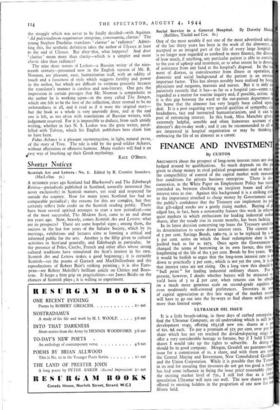Social Service in a General Hospital. By Dorothy M (Bailliere,
Tindall and Cox. 6s.)
ONE of the most notable if not one of the most advertised adv of the last thirty years has been in the work of the almoners, accepted as an integral part of the life of every large hospital. is no longer now regarded as confined to mere finance, the discos of how much, if anything, any particular patient is able to contri to the cost of upkeep and treatment, or to what extent he is dese of assistance from any fund at the hospital's disposal. In the ment of. disease, in convalescence from illness or operation, domestic and social background of the patient is an extre important factor. This has always notably been realised by hos physicians and surgeons, matrons and nurses. But it is only paratively recently that it has—as far as a hospital- can—come to regarded as a matter for routine inquiry and, if possible, action. it is this gap between the ward or the out-patient department the home that the almoner has very largely been called upon deal. It is a post requiring very special qualities of sympathy, ci headedness, tact and instructed humanitarianism, and it can be post of entrancing interest. In this book, Miss Manchee gives extremely helpful, sensible and often humorous account of almoner's day-to-day work ; and it can be recommended to all are interested in hospital organisation or may be thinking embracing the life of an almoner as a career.


























 Previous page
Previous page